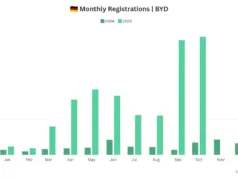BYD (SEHK:1211) has caught investor attention recently as its stock performance over the past month has lagged, with shares down 8%. Many are now weighing whether the current valuation presents a compelling opportunity.
See our latest analysis for BYD.
BYD’s share price has struggled lately, sliding 8.4% over the past month and extending to a 16.7% decline in the last quarter. Despite recent headwinds, its longer-term story remains intact. The company has a 1-year total shareholder return of 9% and an impressive 66% over three years, which points to strong growth foundations even as short-term momentum fades.
If you’re wondering where the next big move in autos could come from, take a look at the rest of the sector with our See the full list for free..
With BYD shares trading well below analyst targets, some see clear value; others argue that recent growth is already priced in. Is this a real buying opportunity, or are future gains already reflected in the stock price?
BYD is currently trading at a Price-to-Earnings (P/E) ratio of 20.7x, notably higher than both its fair value estimate and industry peers. At a last close price of HK$95.2, this multiple suggests investors are paying a premium for expected future earnings, compared to the estimated fair P/E of 17.2x.
The P/E ratio measures how much investors are willing to pay today for each dollar of earnings. For established automakers like BYD, a higher P/E can signal strong growth expectations or market optimism about future profit expansion.
However, BYD’s P/E not only exceeds its calculated fair ratio but also surpasses the Asian Auto industry average of 18.3x and its peer average of 8.7x. This premium implies the market expects BYD to outpace competitors in earnings growth or efficiency, yet the current price could also reflect optimism that may not materialize if results fall short. The market could adjust toward BYD’s fair P/E, which is lower than its present level. This is something investors should note.
Explore the SWS fair ratio for BYD
Result: Price-to-Earnings of 20.7x (OVERVALUED)
However, risks remain if earnings growth slows or if industry sentiment shifts. Both of these factors could prompt a reassessment of BYD’s premium valuation.
Find out about the key risks to this BYD narrative.
While the market premium on BYD may seem steep compared to earnings, our DCF model offers a more optimistic perspective. According to this method, shares are trading about 14.5% below the estimated fair value. Could this mean the current dip is an opportunity, or are there hidden risks the market sees?
Look into how the SWS DCF model arrives at its fair value.
Simply Wall St performs a discounted cash flow (DCF) on every stock in the world every day (check out BYD for example). We show the entire calculation in full. You can track the result in your watchlist or portfolio and be alerted when this changes, or use our stock screener to discover 918 undervalued stocks based on their cash flows. If you save a screener we even alert you when new companies match – so you never miss a potential opportunity.
If you want to dig deeper or have a different take on BYD’s direction, you can explore the data yourself and tell your own story in just a few minutes. Do it your way.
A great starting point for your BYD research is our analysis highlighting 3 key rewards and 1 important warning sign that could impact your investment decision.
Smart investors always keep an eye on what’s next. Use these powerful tools to spot opportunities others might miss and stay ahead of the curve.
This article by Simply Wall St is general in nature. We provide commentary based on historical data and analyst forecasts only using an unbiased methodology and our articles are not intended to be financial advice. It does not constitute a recommendation to buy or sell any stock, and does not take account of your objectives, or your financial situation. We aim to bring you long-term focused analysis driven by fundamental data. Note that our analysis may not factor in the latest price-sensitive company announcements or qualitative material. Simply Wall St has no position in any stocks mentioned.
Companies discussed in this article include 1211.HK.
Have feedback on this article? Concerned about the content? Get in touch with us directly. Alternatively, email editorial-team@simplywallst.com







